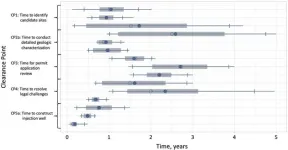(Press-News.org) The relative underperformance of disadvantaged students at school has little do with them lacking the ‘character’, attitude, or mindset of their wealthier peers, despite widespread claims to the contrary, new research indicates.
The study, which analysed data from more than 240,000 15-year-olds across 74 countries, challenges the view often invoked by politicians and educators that cultivating self-belief or ‘growth mindsets’ can reduce class-based learning gaps. Researchers found that no more than 9% of the substantial achievement gap between advantaged and disadvantaged students can be attributed to differences in these social and emotional characteristics.
In almost every country in the world, wealth and socioeconomic status significantly predicts children’s academic success. The new study, by academics from the Universities of Cambridge, Zürich and Tübingen, does not dispute that social and emotional learning positively shapes academic outcomes, but it does question whether it can substantially reduce the academic achievement gap between children from rich and poor families.
This contradicts a widespread conviction among education policymakers. One influential policy paper in the US, for example, has identified “promoting social-emotional and character development” as a key strategy for narrowing the achievement gap. Similarly, a UK Cabinet Office survey in 2015 concluded that disadvantaged and vulnerable children would benefit most from social and emotional learning, and that neglecting this would “perpetuate the cycle of advantage or disadvantage across generations”.
In some countries, social and emotional learning is also big business. The industry was valued at $1.5 billion in the US in 2020, and projected to reach $3.9 billion by 2025. Many of these providers also suggest that their services can help to narrow the achievement gap.
The lead author of the new study, Dr Rob Gruijters, from the Research for Equitable Access and Learning (REAL) Centre at the University of Cambridge, said: “Educational inequality cannot be solved through social and emotional learning. The idea that children can overcome structural disadvantage by cultivating a growth mindset and a positive work ethic overlooks the real constraints many disadvantaged students face, and risks blaming them for their own misfortune.”
Nicolas Hübner, Assistant Professor at the Institute of Education at the University of Tübingen and a co-author, said: “Developing social and emotional skills is hugely valuable for children, but the evidence suggests it has little to do with why low income students are more likely to struggle academically. According to our results, it is not a magic bullet for tackling the socioeconomic achievement gap.”
The study used data from the Programme for International Student Assessment (PISA), covering 248,375 high school students in 74 countries. Researchers analysed both the science test scores, and school-relevant socio-emotional skills, of the most and least advantaged quartile (25%) of students in each country.
Across all 74 countries, the socioeconomic attainment gap was very large. The average difference in PISA science test results between the top and bottom 25% of students sorted by socioeconomic status was 70.5 points; equivalent to almost three years of schooling.
The academic benefits that disadvantaged children derive from socio-emotional skills, however, were found to be relatively similar to those gained by advantaged children. This runs counter to the widely held assumption that focusing on these skills is particularly important and beneficial for children from socioeconomically disadvantaged backgrounds, which underpins many social and emotional learning programmes.
While children from wealthier backgrounds were found to have somewhat higher levels of socio-emotional skills on average, the impact of these discrepancies on the overall achievement gap was modest. The researchers calculated that if, hypothetically, disadvantaged children had the same social and emotional skills as wealthier children and their academic effects were consistent, the learning gap between them would only reduce by no more than 9%.
Strikingly, these findings proved fairly consistent across countries and for different academic subjects (reading, maths and science).
One of the reasons why socio-emotional skills are not a major driver of achievement inequality is that, despite the differences between them, both advantaged and disadvantaged children were found to have reasonably high levels of these skills overall. For example, during the PISA psychometric assessment, 84% of disadvantaged children, and 90% from the advantaged quartile, agreed with the statement “I feel proud that I have accomplished things”.
The researchers add that the 9% of the achievement gap that can be attributed to the social and emotional skills measured by PISA is likely to be an overestimation, because of potential reverse causality in the relationship with academic achievement. Co-author Isabel Raabe, a researcher in the Department of Sociology, University of Zürich, said: “Students who lack the right mindset may perform less well at school, but that may be because their academic performance has eroded their self-belief; not the other way round.”
The authors argue that policies to reduce educational disadvantages should focus on the structural reasons that cause some students from lower socio-economic backgrounds to underperform. These include differences in the quality, resourcing and funding of the schools they attend; the absence in many countries of high-quality preschool options; and a lack of extracurricular resources and out-of-school opportunities compared with their wealthier peers.
The findings are published in Sociology of Education.
END
Disadvantaged children’s struggles at school have “little to do” with character, attitude or a lack of ‘growth mindset’
A global study of 240,000 students challenges the widespread policy conviction that bridging the academic gap between rich and poor students hinges on improving the latter’s work ethic, mindset and socio-emotional skills
2023-12-19
ELSE PRESS RELEASES FROM THIS DATE:
Unveiling molecular origami: A breakthrough in dynamic materials
2023-12-19
Origami, traditionally associated with paper folding, has transcended its craft origins to influence a diverse range of fields, including art, science, engineering, and architecture. Recently, origami principles have extended to technology, with applications spanning solar cells to biomedical devices. While origami-inspired materials have been explored at various scales, the challenge of creating molecular materials based on origami tessellations has remained. Addressing this challenge, a team of researchers, led by Professor Wonyoung Choe in the ...
Scientists spread festive cheer as research reveals Christmas dinner can be healthy
2023-12-19
In less than a week’s time, families around the country will be sitting down to tuck into their traditional Christmas dinner.
While the festive season is often a time of overindulgence, could parts of a festive banquet actually help improve our health?
Experts at Newcastle University, UK, have been researching the different characteristics and compounds of festive trimmings and have found that some of the side-dishes offer significant benefits.
Fighting chronic conditions
Soggy sprouts should be off the menu say Newcastle researchers – ...
U.S. utilities on track to be 100% renewable by 2060
2023-12-18
Utilities in the United States have pledged to transition to 100% renewable electricity by 2060, and although state mandates have played a role, it’s the utilities, themselves, that are leading the transition.
“Many people feel the transition on the policy side isn’t going fast enough,” said Matthew Burgess, a CIRES fellow, CU Boulder assistant professor, and co-author of the paper published today in Climatic Change. “But the private sector is moving faster than we thought. A lot has ...
Giant bacterium uses unique processes to power itself
2023-12-18
Not all bacteria are created equal.
Most are single-celled and tiny, a few ten-thousandths of a centimeter long. But bacteria of the Epulopiscium family are large enough to be seen with the naked eye and 1 million times the volume of their better-known cousins, E. coli.
In a study published Dec. 18 in Proceedings of the National Academy of Sciences, researchers from Cornell and Lawrence Berkeley National Laboratory have for the first time described the full genome of one species of the family of giants, which they’ve named Epulopiscium viviparus.
“This incredible giant bacterium is unique and interesting ...
Quantifying barriers to establishing sequestration wells
2023-12-18
Carbon capture and sequestration (CCS), the process of capturing and storing atmospheric carbon dioxide, is one method of reducing the amount of carbon dioxide in the atmosphere in efforts to reduce the impacts of climate change. While CCS is an essential tool in decarbonizing the U.S. economy, there are barriers that exist to the development, approval, and implementation of a geologic sequestration site, as it requires an appropriate geologic formation, as well as an approved injection facility.
Recent work from the Carnegie Mellon University Department of Engineering and Public Policy (EPP) estimates the time required to develop, approve, and implement ...
Sylvester cancer researcher and technology innovator named fellow of the National Academy of Inventors
2023-12-18
MIAMI, FLORIDA (Dec. 18, 2023) – Shanta Dhar, Ph.D., assistant director of Technology and Innovation at Sylvester Comprehensive Cancer Center at the University of Miami Miller School of Medicine, has been named a fellow of the National Academy of Inventors.
Her research focuses on ways to overcome barriers to precisely target mitochondria – the part of each cell that generates the energy needed for biochemical reactions. Her inventions and innovative contributions in nanomedicine, mitochondria-targeted drug delivery, and platinum-based prodrugs help guide targeted therapies in cancer and other diseases.
Dhar, an associate professor of biochemistry and molecular biology ...
Team led by UMASS Amherst discovers how to sabotage antibiotic-resistant ‘superbugs’
2023-12-18
Antibiotic-resistant “superbugs” that can defeat efforts to kill them are an urgent public health crisis, and according to the Centers for Disease Control, more than 2.8 million antibiotic-resistant infections occur each year. Researchers across the world are scrambling to meet the challenge. A collaborative team of researchers led by the University of Massachusetts Amherst and including scientists from the biopharmaceutical company Microbiotix recently announced that they had successfully learned how to sabotage a key piece of machinery that pathogens use to infect their host cells, and have developed a test to identify the next-generation drugs ...
How effective are opioid medications for cancer pain?
2023-12-18
Researchers examining the data on opioids for pain caused by cancer have found surprisingly large gaps in evidence regarding the true benefits of these medicines for cancer pain. The review challenges the commonly held view that opioids are the most powerful pain relievers.
The University of Sydney-led review highlights there is no ‘one size fits all’ treatment approach for cancer pain, urging health professionals and patients to carefully weigh up the evidence when deciding on a suitable pain management plan.
Opioid pain relievers are the most common treatment for cancer pain management. Many international guidelines including the ...
Firearms and hanging top methods for suicide in US as rates continue to rise
2023-12-18
Embargoed for release until 5:00 p.m. ET on Monday 18 December 2023
Annals of Internal Medicine Tip Sheet
@Annalsofim
Below please find summaries of new articles that will be published in the next issue of Annals of Internal Medicine. The summaries are not intended to substitute for the full articles as a source of information. This information is under strict embargo and by taking it into possession, media representatives are committing to the terms of the embargo not only on their own behalf, but also on behalf of the organization they represent.
----------------------------
1. ...
B cell deficient patients gain protective T cell immunity following SARS-CoV-2 vaccination and infection, study finds
2023-12-18
B cell deficiency is a common condition that can result either from immunosuppressant drugs used to treat autoimmune disease or certain cancers — such as rituximab (RTX) — or from natural immune deficiency. These patients suffer from a weakened immune system that is less effective at combating both viral and bacterial diseases. As B cells are a key type of immune cell that produces antibodies, a deficiency results in a significant decrease in antibody count that can lead to severe disease or death upon infection with SARS-CoV-2.
Researchers at the Ragon Institute of Mass General, MIT, and ...
LAST 30 PRESS RELEASES:
Ketamine high NOT related to treatment success for people with alcohol problems, study finds
1 in 6 Medicare beneficiaries depend on telehealth for key medical care
Maps can encourage home radon testing in the right settings
Exploring the link between hearing loss and cognitive decline
Machine learning tool can predict serious transplant complications months earlier
Prevalence of over-the-counter and prescription medication use in the US
US child mental health care need, unmet needs, and difficulty accessing services
Incidental rotator cuff abnormalities on magnetic resonance imaging
Sensing local fibers in pancreatic tumors, cancer cells ‘choose’ to either grow or tolerate treatment
Barriers to mental health care leave many children behind, new data cautions
Cancer and inflammation: immunologic interplay, translational advances, and clinical strategies
Bioactive polyphenolic compounds and in vitro anti-degenerative property-based pharmacological propensities of some promising germplasms of Amaranthus hypochondriacus L.
AI-powered companionship: PolyU interfaculty scholar harnesses music and empathetic speech in robots to combat loneliness
Antarctica sits above Earth’s strongest “gravity hole.” Now we know how it got that way
Haircare products made with botanicals protects strands, adds shine
Enhanced pulmonary nodule detection and classification using artificial intelligence on LIDC-IDRI data
Using NBA, study finds that pay differences among top performers can erode cooperation
Korea University, Stanford University, and IESGA launch Water Sustainability Index to combat ESG greenwashing
Molecular glue discovery: large scale instead of lucky strike
Insulin resistance predictor highlights cancer connection
Explaining next-generation solar cells
Slippery ions create a smoother path to blue energy
Magnetic resonance imaging opens the door to better treatments for underdiagnosed atypical Parkinsonisms
National poll finds gaps in community preparedness for teen cardiac emergencies
One strategy to block both drug-resistant bacteria and influenza: new broad-spectrum infection prevention approach validated
Survey: 3 in 4 skip physical therapy homework, stunting progress
College students who spend hours on social media are more likely to be lonely – national US study
Evidence behind intermittent fasting for weight loss fails to match hype
How AI tools like DeepSeek are transforming emotional and mental health care of Chinese youth
Study finds link between sugary drinks and anxiety in young people
[Press-News.org] Disadvantaged children’s struggles at school have “little to do” with character, attitude or a lack of ‘growth mindset’A global study of 240,000 students challenges the widespread policy conviction that bridging the academic gap between rich and poor students hinges on improving the latter’s work ethic, mindset and socio-emotional skills



